Bass player to the stars shares stories from his fascinating career
Exclusive interview with FBPO’s Jon Liebman
April 12, 2021
Ivan “Funkboy” Bodley has had quite the career. The Berklee grad has put his bass chops to work for 50 Rock and Roll and Hall of Fame inductees, including Sting, Elvis Costello, and the Temptations, as well as 12 Broadway shows. He’s also served as a music director for Sam Moore (Sam & Dave), Martha Reeves & the Vandellas, and The Shirelles. Most recently, he toured with Humble Pie. Beyond all of that, he’s been inducted into the New York Blues Hall of Fame and is the author of Am I Famous Yet? Memoir of a Working-Class Rock Star.
FBPO: Tell me about your musical upbringing and how you became a bass player.
Funkboy: That is an interesting story. I have no musicians in the family, and no particular inspiration. I found out later in life that my grandfather was in the Navy shipyard band, playing trombone during World War II. But I didn’t know that growing up; I didn’t know he was a musician. There was no music program at my high school, so I really had to pick up things on my own. I came to it very late in life. I dabbled with a couple of instruments, taking lessons on piano and guitar, but nothing stuck. As a kid, nothing lasted more than probably about six months or a year, tops.
FBPO: You grew up in Chattanooga, right?
Funkboy: I did. Born and raised, Chattanooga, Tennessee. Absolutely. And then somewhere around senior in high school I just decided, I think bass. I think bass. Bass started to speak to me. I have a theory that your instrument chooses you, that you don’t necessarily choose your instrument.
FBPO: Okay, but there must have been something that attracted you to the bass – or that attracted the bass to you.
Funkboy: Yeah, clearly. But whatever that was that didn’t happen when I tried to play viola when I was in sixth grade. I’m like, “Nah, that’s not happening.” And guitar, “Nah, that’s not happening.” Piano was kind of fun, but I gave that up immediately. But then, the bass. I remember specifically a couple of things. I remember seeing Mother’s Finest live in concert, opening for the Atlanta Rhythm Section in Chattanooga, Tennessee. Wyzard was their bass player, and Moses Mo was their guitar player, who I’ve come to work with in very recent years. And this was before I played an instrument, before I even touched a bass. And I’m looking at them going, “I’m not sure what that is, but I want to do that. That’s something special, what they have going on there.” My mother’s record collection was based in Gladys Knight & the Pips and Stevie Wonder, some Beatles stuff, and some show tunes. That stuff immediately appealed to me. And then the next thing I remember happening was I saw Rick James on The Midnight Special.
FBPO: That must have been a real eye-opener for you.
Funkboy: Right? This is going way back. And he was playing the song, “You and I,” which is basically a four-note bassline on two strings. And there was a guy at my high school – some of the students lived in dorms, some of the guys were day students, I was a day student – but one of the guys in the dorms had a bass that I think he might have made himself, that only had an E and an A string on it. It only had two strings on it, which I came to find out later, those are the money notes, those are the ones we get paid for. All you really need is those two strings. This was at the Baylor School for Boys in Chattanooga. It was senior year of high school. I just figured this out right before I left. So I started picking out this bassline to this Rick James song in this kid’s dorm room, just by ear. And that was it. I was hooked immediately after that.
FBPO: Judging from the music you were listening to, is it safe to say that James Jamerson and Paul McCartney were also among your early bass influences?
Funkboy: Well, without realizing it, absolutely. And I’d have to put John Entwistle right at the top of that list, because you listen to stuff you listen to in high school, and you’re hearing John tear up the speakers, you’re like, “What the hell is going on?” And even Chris Squire to a lesser degree. But those are the people that, they’re around. But for sure, Jamerson and even more so, and without realizing it completely, David Hood and Duck Dunn, because those records that were coming out around northern Alabama, western Tennessee. Those solo records were coming out, like King Floyd and Sam & Dave, those were wildly influential on me growing up before I played. And the first 45 I ever bought was Sly and the Family Stone, “If You Want Me to Stay.”
FBPO: How did your career get rolling? You did a lot of stuff on the business side too, didn’t you?
Funkboy: I had a whole other career before this. I was a publicist for Epic Records in the ’80s, late ’80s, so I was doing the whole business thing. I did that for three years. I had the whole corporate Amex card, the expense account, the whole deal. And what I realized was the music business was about marketing, business. It wasn’t about music. And I had interest in both. And I was like, “Well, that’s not really what I want to do.” So while I was in the Los Angeles office, I was manager of West Coast, Publicity for Epic, Portrait, and Associated Labels, that whole thing, I was going to take night classes at BIT (Bass Institute of Technology) in Hollywood. I got their summer certificate at the same time I was working at the record label.
FBPO: How did you manage juggling both sides at the same time?
Funkboy: I got a chance to move to England. I just dropped out of the whole music business, turned in my Amex card, and got on a plane to London. And for about a year-and-a-half there, I was just playing, all I was doing was playing. I was playing in pubs, playing in bars, and I was booking music at a restaurant and playing at the restaurant five nights a week. That was all going pretty good, but two things were happening. One, my immigration status was going to be a problem, long-term. I was an alien. And two, I felt like I was missing huge gaps in just musical knowledge. I’d been playing for years at that point, and I knew a lot of stuff. I was trained at the feet of George Porter and Aaron Neville, I was seeing those people when I was at Tulane in New Orleans. Some of my early professional semi-pro gigs were in pickup bands, backing up Bo Diddley in New Orleans and playing at the Jazz Fest and stuff like that. That was a real street-level education.
FBPO: How did you break into the London scene? Did you know anyone there?
Funkboy: I had a girlfriend who got me over there and then the scene was just like, in those days, you looked in the classified ads and you found a band looking for a bass player, or put a classified in yourself, “Bass Player Available,” and you get pub gigs. And you can actually [be] making 27 pounds, 50 a man per night, actually pay the rent. The main band I was working with was doing working man’s pubs, street-level working for a living, hard rock covers, three-chord rock covers, that kind of thing. So when I figured out what was missing, and coupled with the fact that my pending immigration status was about to be a problem, I said, “All right, I need to go to music school. I need to seriously go to school.” So that’s when I came back to the States and went to Berklee. And I got out of there magna cum laude, ’92, moved to New York City, temped for about three years until the gigs income outweighed the temp income. And haven’t had a day job since ’95.
FBPO: Did you know people from Berklee, or even LA, when you got to New York, that could help you out?
Funkboy: Yeah, I’ve met Berklee people that came to New York along the way. But the thing that got the ball rolling really had to be the first time I played with The Shirelles. The drummer in The Shirelles was also the drummer with Wilson Pickett. He also played with the Uptown Horns. So there was a situation maybe a year or two later where the Uptown Horns needed a bass player last minute, and their drummer remembered that I’d come in last minute and done this job where I’d done my homework. So he recommended them to me. And the first gig I did with the Uptown Horns was at the Bottom Line. It was the Uptown Horns Review with Soozie Tyrell, Bernard Fowler, Vernon Reid, and Peter Wolf, as special guests.
FBPO: That’s quite a cross section of people!
Funkboy: It was a big show. They gave me a normal-bias cassette tape that they’d got at the 99-cent store of their record. I had to go home, transcribe it, learn it, one rehearsal, nail it, and then you get called back a second time. The Uptown Horns, The Shirelles led to all the other classic soul and R&B acts. And then Uptown Horns became the rhythm horn section band of choice for acts traveling through town to use pickup bands. So through the Uptown Horns, I met Solomon Burke, Martha Reeves, Sam Moore, Percy Sledge, Eddie Floyd, Rufus Thomas, Carl Thomas, that kind of thing. That was a tremendously valuable asset. But going into it, you don’t know what’s going to lead to what, you can’t tell. So I just know in retrospect that’s how it happened.
FBPO: What inspired you to write a memoir?
Funkboy: I’ve just got all these road stories, things that happen that are just—any time something would happen on a job, I would go, “Oh, this reminds me of so-and-so.” And I would start telling these stories and people would say, “Man, you got to write a book.” And you don’t take it seriously, you’re like, “Yeah, yeah. Whatever.” And then all of my writing, of music and of words, started to happen in wintertime, because a lot of our work is seasonal. Summers, we get really busy. Concerts, outdoor stuff, weddings take place in the summer. And then sometimes in the winter you can go, “So is that it? Is the career over? What happened?”
FBPO: The name of the book is, Am I Famous Yet?
Funkboy: Yeah. Yes it is.
FBPO: Where is it available, if somebody from our audience wants to pick it up?
Funkboy: It is available through my website. I will be able to send them personalized, autographed copies. It is also available through Amazon in paperback and Kindle editions.
FBPO: What else is keeping you busy these days?
Funkboy: Man, that’s been so frustrating, because going into the shutdown, the week before the shutdown, I did two multi-act oldie bills with The Drifters, The Flamingos, The Tokens, just a bunch of things. It was planning out to be a really busy year. And I subbed on Ain’t Too Proud, The Temptations musical that week, I subbed on Rock of Ages off-Broadway that week. And then the world shut down. And I was like, “Wow, that’s dark.” And the last two winters before that we’d done Humble Pie tours, so things were looking good. In fact the reason I had this new deal with Color Red Music is because I started collaborating with my friends who were also similarly locked down. Everybody now seems to have a home recording rig, so we started trading files back and forth, and back and forth. We used to meet in person and get together and play and record each other’s compositions, but now we had to do it long distance. So I’ve been doing a whole lot of writing and recording mixing too, because I had, I think, 60 unmixed tracks in the can from a previous recording project that I’d done with my trio compatriots. So I remixed all of that and we’re submitting everything to Color Red Music who has got a wonderful licensing arm. So all my past catalog is now available for licensing for films and commercials.
FBPO: That’s a Colorado company, isn’t it?
Funkboy: It certainly is!
FBPO: I interviewed Freekbass a couple of months ago…
Funkboy: Yes! That’s my label mate! And George Porter too. George is now on Color Red, I think. I owe that man money, I’ve stolen so much of his stuff. I owe him money! I told him, too.
FBPO: Tell me about your gear.
Funkboy: Oh, man. Well, it depends on the gig. The A-Rig these days is some type of Fender P Bass with the foam under the strings. The Humble Pie rig was a Hartke, two 410s and the LH1000 head. If I’m around town, I’ve got the little MarkBass 112 combo that I even can take on the subway, if I’m local. I’m using Tech 21. The Fly Rig has been my go-to for, man, so much stuff. And literally I’ve done gigs where I just put a P bass on the backline for a fly date, and the only thing I’ll bring is the Fly Rig. I’ll actually travel and I’ll pick up a rented bass and I’ll get a show out of it somehow.
FBPO: Tech 21 has become so popular.
Funkboy: Man, I can’t say enough good stuff about them. I was very slow to come to the whole SansAmp party. I didn’t get it initially. And the bass driver, I didn’t have enough musical maturity to understand what that box did. Like sometimes you see a compressor pedal, you’re like, “What does that do? I’m not sure. You turn on a flanger, and you’re like, “Okay, I hear what that does.” But a compressor, you’re like, “What is it doing?” And the amp modeling, the very subtle yet beautiful overtone series that it just lays over your instrument perfectly. Before that, I’d just kind of been using amps, an amp and a cable, that was sort of my thing. But when this Fly Rig came out, the bass Fly Rig, and I started plugging that thing in, and sending the DI to front of house, I’m like, “That’s it! I’m done.” I use that thing for everything now. I use it for recording, I use it for live, the amp modeling is just, it’s indescribably good. I don’t know what the magic of that box is. On top of that, the bass Fly Rig has got some brilliant effects. It’s got a really buttery chorus effect in it. And then it’s got this combination of, it’s like an envelope follower and an octave divider. When you stomp that thing in, suddenly it sounds like you’re playing a Minimoog. It’s tremendous. Every time I trick that thing on to whatever band I’m in, the whole band turns around and looks at me like, “What the hell is that?!”
FBPO: Love it!
Funkboy: Yeah. “Fly Rig, my friend.” So I know my sound is set. I know it’s good. I know it’s going into the front of house. I know it was coming back through the monitors brilliantly. And then whatever rented amp I have to be through, I don’t care if I just need something to make it louder. That’s all.
FBPO: What kind of strings do you play?
Funkboy: DR neon color brights.
FBPO: What advice do you have for somebody who wants to learn to play bass?
Funkboy: It depends what your goals are. I don’t think the primary goal should ever be, “I’m going to use this to become rich and famous.” That’s not what music is about. It’s not a productive way to learn things. But what you’re talking about, and I’ve seen this a lot, like if you’re able to connect with a passion, and usually what you’re talking about is a lifelong passion, you’ve always loved the bassline on X,Y & Z record, whatever it is, and wanted to learn how to play it, that can be invaluable. Whether it becomes your hobby or whatever, just do that, just connect with the instrument, connect with the music that turns you on, and figure out how it works and what makes it work and participate in it.
FBPO: What about the basics? The rudiments?
Funkboy: I think you have to approach your rudiments, because you have to understand the things that construct the basslines that you like. What scale tones are these? What’s a Mixolydian scale? What’s the pentatonic scale? So there’s certain rudiments that you have to pay attention to. But you can get functional on the bass probably quicker than almost any other instrument. The tuning is even across all four strings, unlike a guitar. You don’t have to worry about the black keys and the white keys. Once you learn a fingering pattern on bass, you’ve been given a gift. Now you have that pattern for every possible key.
FBPO: I tell people that all the time. I say, “If you can play something anywhere on the bass, you can play it everywhere on the bass.”
Funkboy: Mm-hmm. Mm-hmm. 100%. 100%. And there are tricks like that, little gifts like that. I think if you want to really learn bass, find out what about the music really appeals to you, what really turns you on. And then just go, man. Just imitate that. Figure it out. And when you can replicate it yourself, then you’re in a position to move forward and maybe create your own stuff.
FBPO: What would you be if you weren’t a bass player?
Funkboy: That’s really tough. I had a career in the music business as a publicity PR person, so I guess I was that. But the reason that I decided to go ahead and pursue music full-time was because I really felt like I had no other option. There was nothing else I wanted to do. I started college as a biomedical engineering student, did two years of that, and said, “Nah, it’s not for me.” And I graduated with a psychology degree, and I was like, “Nah, that’s not really for me.” You have to have a passion for it beyond the average casual listener to make a go at it. And because of that, it’s even hard for me to imagine what else I would do, because I shut down all my other choices to be able to do this.
See Jon’s blog, with key takeaways from this interview here.
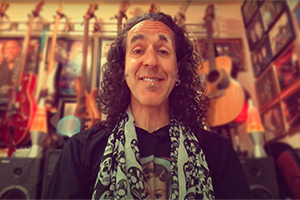
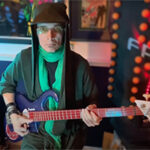
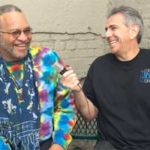
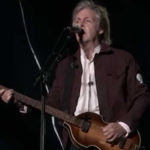
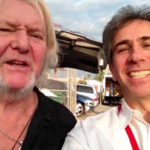

Very cool interview with Funkboy.
Saw you at the Aretha Franklin Tribute in Raritan NJ. Enjoyed the show very much. Found myself focusing on you and the other bandmembers as much as the singers. I enjoyed the music and thought you were a very tight band. I liked your stage presence.